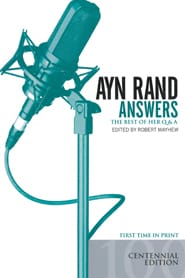

In the decades after the publication of Atlas Shrugged, Ayn Rand turned to nonfiction writing and public speaking to advocate her philosophy and apply it to cultural affairs. People flocked to hear her insightful and provocative talks — and to ask her a question during Q&A periods. Here is the best of that material.
The book encompasses questions and answers from lectures and several media interviews, spanning the years 1958 to 1981. Reading it one can gain not only new insights into Rand’s ideas, but also a sense of what she was like as a person.
As editor and Objectivist scholar Robert Mayhew notes in his introduction: “Given the extemporaneous nature of the material, it is not surprising that the transcripts required editing . . . . Most of the editing I did consisted of cutting and line-editing to bring the material closer to the level of conciseness, clarity and smoothness appropriate to a written work.”
“Do you support capital punishment?”
“How does Objectivism apply to underdeveloped regions, such as in Africa or the American South?”
“Is Hemingway a Romantic writer?”
“What is your opinion of humanism?”
“Could you comment on Ronald Reagan and his role in the 1976 presidential election?”
“Is there room in your philosophy for God?”
“How do you distinguish between literature and popular writing?”
“What do you think of libel and slander laws?”
“What is your purpose in life?”
This book presents Ayn Rand’s fascinating answers to these and hundreds of other questions like them. The scope of topics covered is impressive, from free will to Jane Fonda, from legitimate vs. illegitimate questions to Rand’s favorite sculptor. There is something for everyone here, from the newcomer to Rand’s ideas to the seasoned student of her philosophy.
What do you think will happen when you die?
I assume I’ll be buried. I don’t believe in mysticism or life after death. This doesn’t mean I believe man’s mind is necessarily materialistic; but neither is it mystical. We know that we have a mind and a body, and that neither can exist without the other. Therefore, when I die, that will be the end of me. I don’t believe it will be the end of my philosophy.
What is the Objectivist view of free verse?
That it’s lower than free lunches.
Don’t I have the right to be irrational?
There is no such thing as freedom or rights that stand above and against reason and reality. Your rights are based on reality and derived by reason from observation of reality. You don’t have the moral right to be irrational. Of course, in a free society you can do whatever you want, so long as you don’t violate the rights of others.
This question is going to sound silly . . .
Never apologize for your own thoughts, and don’t estimate them for me in advance.
Rand’s political views are often compared to those of other figures on the right, such as Adam Smith, Ludwig von Mises and Ronald Reagan. But Rand takes great care to distinguish her own defense of laissez-faire capitalism from their positions — above all, from their philosophic views.
Asked about Smith, Rand credits him for his economic theories but is critical of the view that the moral justification of capitalism is that it leads people to act, unintentionally, for the “greater good.”
Similarly, when asked about Ludwig von Mises and the Austrian school of economics, Rand is laudatory of their economic theories but critical of Mises’s attempt to “substitute economics for philosophy,” which she says “cannot be done.”
As for Reagan and the entire religious right, Rand is adamant that they should not be regarded as defenders of capitalism at all. “They are not for free enterprise; they want controls — spiritual, moral, and intellectual controls.”
Rand argues that man has free will, which she holds consists, fundamentally, of the choice to think or not. “Free will is self-evident through observation,” Rand says. “Everything you observe about human consciousness tells you that it operates by choice: not only your introspection, but also your observation of other people.”
Many scientific-minded people, however, think that the laws of identity and of cause and effect rule out the existence of free will. In a lengthy answer to the question “Doesn’t free will contradict the idea that man has a specific identity?” Rand explains why she regards this question as invalid, as an instance of the fallacy of “rewriting reality.” It represents, she argues, “an arbitrary construct of determinism” and “the attempt to prescribe what you think in logic should be the nature of reality. But you have no right to any concept of reality or logic unless the material of your concepts came from reality.”
Because she sees ideas as shaping the course of a person’s life and of human history, Ayn Rand regards education — the development of a child’s mind — as one of the most important issues in life.
Politically, Rand opposes government schools: “Education should be private, and children should go wherever their parents decide to send them.” Public education puts the state in charge of the ideas children are taught. In America this helped make possible the rise of Progressive education, which Rand criticizes as the most destructive trend in education.
Rand argues that proper education is the solution to the country’s cultural and political problems. To fight for a better culture, she says, requires first and foremost changing the ideas that dominate the universities, particularly the ideas taught by the nation’s philosophy departments. “[I]f I had a magic power to change things fast, I would change the philosophy departments of today’s universities.”
Throughout Ayn Rand Answers, one seldom encounters ideas one has heard before. Rand is thoroughly unconventional.
Rand’s views do not fall into any traditional category, such as “liberal” or “conservative.” For example, she opposes religion and the welfare state — and supports capitalism and the right to an abortion.
In response to many questions, Rand articulates distinctive principles, such as the principle that moral responsibility for innocents harmed in war belongs solely on the side that initiated force, or that it is morally wrong to help others if it comes at the expense of one’s own interests.
Even when Rand advocates a familiar position, it is usually on distinctive grounds. Rand supports abortion rights, for instance, on the grounds that antiabortionists are demanding the sacrifice of the actual to the potential, of an individual human being to an embryo. “The basic principles here are: never sacrifice the living to the nonliving, and never confuse an actuality with a potentiality.”
As befits someone who wrote a book called The Virtue of Selfishness, Ayn Rand is a passionate valuer, who therefore has strong reactions, positive and negative, to the world around her. And she can articulate the reasons for her reactions.
In Ayn Rand Answers you will learn more about Ayn Rand the person. Who is her favorite sculptor? What is her response to Beethoven’s music? Why did she react so negatively to Ronald Reagan? Why does she say of the game of chess, “I resent it on principle.” Why does she tell a questioner who asks, “Doesn’t open immigration have a negative effect on a country’s standard of living?” — that he is dropping a personal context? And why is her immediate response to the question “Is a girl’s impression of her father her impression of manhood?” — “God help womankind if it were!”